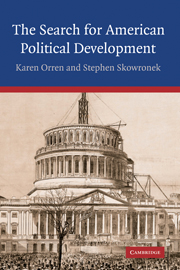4 - Political Development: The Definition
Published online by Cambridge University Press: 24 May 2010
Summary
… although laws may be changed according to circumstances and events, yet it is seldom or never that the constitution itself is changed; and for this reason the new laws do not suffice, for they are not in harmony with the constitution that has remained intact.
Niccolò MachiavelliTogether, the cultural critique of developmental thinking, recounted in Chapter Two, and the institutional turn in historical research, recounted in Chapter Three, leave APD spinning around a wobbly center. Neither provides a ready response to a disarmingly simple question: What is political development? With the concept purged of teleology, the leading formulation so far is the inconclusive metaphor of “path.” In this chapter, we set these literatures aside for the purpose of offering a definition that identifies political development as a distinguishable event, one that can be established empirically and is a phenomenon worth study in its own right.
That a definition of this sort is desirable may not be self-evident. No one has complained that the topics addressed so far by APD scholars are misguided or that the substantive payoff on particular historical questions of broad interest has been inadequate. In fact, the flip side to APD's current lack of focus is the growing attachment of historical researchers to other areas of political science with well-established protocols of their own – political economy, for instance, or public law, or comparative government. Under these circumstances, why look for trouble?
- Type
- Chapter
- Information
- The Search for American Political Development , pp. 120 - 171Publisher: Cambridge University PressPrint publication year: 2004



